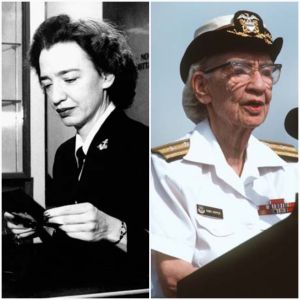
At the outbreak of WWII, Hopper signed up to join WAVES (Women Accepted for Voluntary Emergency Service), a part of the U.S. Naval Reserve. Her application was initially rejected because she was deemed too old and too thin per enlistment standards. Determined, Hopper obtained a waiver for these requirements and was sworn into WAVES in 1943, the same year she earned her PhD. She graduated first in her class from the Reserve’s training school.
Commissioned as a Junior Grade Lieutenant in 1944, Hopper started on her first assignment at Harvard University’s Bureau of Ordinance Computation. She worked with Naval Reserve officer Dr. Howard Aiken on the Harvard Mark I, a 51-foot-by-8-foot giant “electromechanical calculator” that would become the predecessor to today’s personal computers.
Mark I was the first operational machine capable of automating complex mathematical computations. Hopper was responsible for monitoring the programs and her success with the Mark I and later the Mark II and III earned her a Naval Ordnance Development Award in 1946. She even inadvertently coined the term “computer bug” when she found a trouble-making moth in Mark I’s circuitry system. “From then on, when anything went wrong with a computer, we said it had bugs in it,” she remarked in a 1984 New York Times interview.
Hopper’s experience with the Mark series led her to question the efficiency of computer programming codes at the time. In 1949, she joined the Eckert-Mauchly Corporation to further her vision of a common computer language. There she introduced the concept of a “universal compiler”—a bridge between English commands and codes that could be recognized by the computer. This led to the development of COBOL, a standardized computer language, and translator manuals for converting non-COBOL languages.
Affectionately referred to as “Amazing Grace,” Hopper held more than 40 honorary doctoral degrees and had a U.S. warship—the USS Hopper—named after her. In 1973, she became the first woman to be recognized as a Distinguished Fellow of the British Computer Society. Later in 1985, she was promoted to the rank of Rear Admiral.
We honor you, Grace Hopper.
